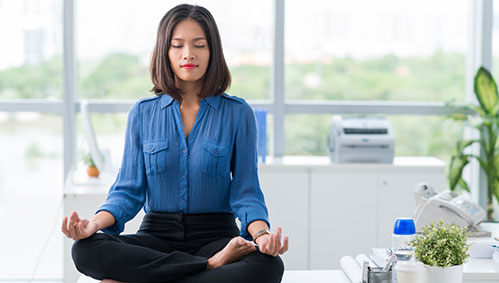
Nov 16, 2015 ● Kate Lopaze
7 Body Language Tricks For Nailing Your Job Interview
In a phone interview, you could be wearing your favorite pajamas while kicking back in your easy chair—no one would be the wiser. However, in an in-person interview, your demeanor is part of the package. Your interviewer is evaluating you just as much as your resume and your answers, so being aware of what you’re putting across is an essential part of interview prep.
Here are 7 body language strategies to help you keep calm under the hot lights of interview scrutiny and project your best self.
 When you’re getting dressed and ready to go, take a few minutes to stretch your muscles and do some deep breathing. If you’re like me and have jitters before every interview, no matter how prepared you feel, this can help your mind focus and de-stress. The stretching keeps your muscles from being too tense when you get to the interview, which might make you come off as stiff and awkward.
When you’re getting dressed and ready to go, take a few minutes to stretch your muscles and do some deep breathing. If you’re like me and have jitters before every interview, no matter how prepared you feel, this can help your mind focus and de-stress. The stretching keeps your muscles from being too tense when you get to the interview, which might make you come off as stiff and awkward.
 When you arrive, be sure to smile at whoever greets you first and at your interviewer(s). If you feel like your toothiest grin is pasted to your face, maybe dial it back a bit. It’s okay to show a little bit of teeth (it makes the smile seem more genuine), but no one feels reassured by a mouth full of bared teeth—that one goes back all the way to our prehistoric ancestors. Also make sure you’re involving your eyes: studies have shown that crinkling your eyes up just a little has a warm and welcoming effect to the recipient. Try to have a polite, easy smile for everyone you meet; it shows you’re happy to be there and enthusiastic about the opportunity.
When you arrive, be sure to smile at whoever greets you first and at your interviewer(s). If you feel like your toothiest grin is pasted to your face, maybe dial it back a bit. It’s okay to show a little bit of teeth (it makes the smile seem more genuine), but no one feels reassured by a mouth full of bared teeth—that one goes back all the way to our prehistoric ancestors. Also make sure you’re involving your eyes: studies have shown that crinkling your eyes up just a little has a warm and welcoming effect to the recipient. Try to have a polite, easy smile for everyone you meet; it shows you’re happy to be there and enthusiastic about the opportunity.
 We’ve become pretty casual as a society, which often extends to the workplace. Relaxed dress codes and flexible work arrangements are common these days. But in an interview, while you don’t want to be stiff and awkward, you should definitely err on the side of formality. Always sit up as straight as you can, with shoulders lowered and squared. You might have heard that pushing your shoulders back is the best way to approach posture in an important setting—but that can often have the effect of thrusting out your chest, which can seem provocative or confrontational.
We’ve become pretty casual as a society, which often extends to the workplace. Relaxed dress codes and flexible work arrangements are common these days. But in an interview, while you don’t want to be stiff and awkward, you should definitely err on the side of formality. Always sit up as straight as you can, with shoulders lowered and squared. You might have heard that pushing your shoulders back is the best way to approach posture in an important setting—but that can often have the effect of thrusting out your chest, which can seem provocative or confrontational.
 As for your arms, those can be awkward. Should you hold them straight and rigid at your side at all times? (Nope.) Gesture wildly to illustrate every point? (Try again.) Keep them bent slightly at the elbow and resting gently at your sides? (Bingo.) If it feels awkward keeping your arms down or you’re prone to fidgeting, clasp your hands loosely in front of you, either in your lap or on the table. It’s important to stay loose, because seeming too tightly coiled can make you look small and retreating. Too loose, and it seems like you’re not taking the interview seriously. The best bet is to adjust your arms as the conversation ebbs and flows, but have the default position be resting casually at your sides.
For legs, crossed confidently at the knee is the way to go. If you cross your legs at the ankles, that can give your lower half a downward slope and ruin the good work you’ve done with your overall posture.
As for your arms, those can be awkward. Should you hold them straight and rigid at your side at all times? (Nope.) Gesture wildly to illustrate every point? (Try again.) Keep them bent slightly at the elbow and resting gently at your sides? (Bingo.) If it feels awkward keeping your arms down or you’re prone to fidgeting, clasp your hands loosely in front of you, either in your lap or on the table. It’s important to stay loose, because seeming too tightly coiled can make you look small and retreating. Too loose, and it seems like you’re not taking the interview seriously. The best bet is to adjust your arms as the conversation ebbs and flows, but have the default position be resting casually at your sides.
For legs, crossed confidently at the knee is the way to go. If you cross your legs at the ankles, that can give your lower half a downward slope and ruin the good work you’ve done with your overall posture.
 If you have relaxed, confident body language below the neck, you’ll want to make sure your head is in the game as well. As with the arms and sitting posture, don’t tighten up too much and stare straight ahead. The most professional-seeming head posture is keeping your chin tilted slightly sideways and up. This makes it look like you’re listening (which, ideally, you are), and that you’re confident but not aggressive. Tilting your chin straight up and out can look like you’re challenging the interviewer or reacting stubbornly.
Also, know ahead of time whether you’re prone to unconscious facial tics like blinking too much when you’re nervous or licking your lips. Practice interview questions in the mirror, and try to keep those habits under control as you’re speaking. These can undermine your confident image.
If you have relaxed, confident body language below the neck, you’ll want to make sure your head is in the game as well. As with the arms and sitting posture, don’t tighten up too much and stare straight ahead. The most professional-seeming head posture is keeping your chin tilted slightly sideways and up. This makes it look like you’re listening (which, ideally, you are), and that you’re confident but not aggressive. Tilting your chin straight up and out can look like you’re challenging the interviewer or reacting stubbornly.
Also, know ahead of time whether you’re prone to unconscious facial tics like blinking too much when you’re nervous or licking your lips. Practice interview questions in the mirror, and try to keep those habits under control as you’re speaking. These can undermine your confident image.
 When you’re preparing for your interview, practice your “interview voice.” This probably isn’t the time to demonstrate the new British accent you’ve been working on, but rather an extra-steady version of your regular voice. Try smiling slightly when you talk—it gives your voice an open, confident quality. Even if you’re nervous, try not to let your voice waver or decrease in volume—that undermines the self-assured vibe you’re trying to convey.
Taking the time to practice these beforehand will make them so much easier to achieve when it comes time for the interview. You know you’re ready to rock this opportunity… don’t let your body slow you down!
When you’re preparing for your interview, practice your “interview voice.” This probably isn’t the time to demonstrate the new British accent you’ve been working on, but rather an extra-steady version of your regular voice. Try smiling slightly when you talk—it gives your voice an open, confident quality. Even if you’re nervous, try not to let your voice waver or decrease in volume—that undermines the self-assured vibe you’re trying to convey.
Taking the time to practice these beforehand will make them so much easier to achieve when it comes time for the interview. You know you’re ready to rock this opportunity… don’t let your body slow you down!
1. Stretch it out.
 When you’re getting dressed and ready to go, take a few minutes to stretch your muscles and do some deep breathing. If you’re like me and have jitters before every interview, no matter how prepared you feel, this can help your mind focus and de-stress. The stretching keeps your muscles from being too tense when you get to the interview, which might make you come off as stiff and awkward.
When you’re getting dressed and ready to go, take a few minutes to stretch your muscles and do some deep breathing. If you’re like me and have jitters before every interview, no matter how prepared you feel, this can help your mind focus and de-stress. The stretching keeps your muscles from being too tense when you get to the interview, which might make you come off as stiff and awkward.
2. Smile! You’re on stage.
 When you arrive, be sure to smile at whoever greets you first and at your interviewer(s). If you feel like your toothiest grin is pasted to your face, maybe dial it back a bit. It’s okay to show a little bit of teeth (it makes the smile seem more genuine), but no one feels reassured by a mouth full of bared teeth—that one goes back all the way to our prehistoric ancestors. Also make sure you’re involving your eyes: studies have shown that crinkling your eyes up just a little has a warm and welcoming effect to the recipient. Try to have a polite, easy smile for everyone you meet; it shows you’re happy to be there and enthusiastic about the opportunity.
When you arrive, be sure to smile at whoever greets you first and at your interviewer(s). If you feel like your toothiest grin is pasted to your face, maybe dial it back a bit. It’s okay to show a little bit of teeth (it makes the smile seem more genuine), but no one feels reassured by a mouth full of bared teeth—that one goes back all the way to our prehistoric ancestors. Also make sure you’re involving your eyes: studies have shown that crinkling your eyes up just a little has a warm and welcoming effect to the recipient. Try to have a polite, easy smile for everyone you meet; it shows you’re happy to be there and enthusiastic about the opportunity.
3. Your handshake brings all the boys to the yard.
via [zimbio.com] According to 30 Rock’s Jack Donaghy (Alec Baldwin), “handshakefulness” is one of the pillars of business achievement. And while you may not want to base your career strategies around Liz Lemon and company, Jack is right. Your handshake matters! It should be medium-firm (no death grip to show how strong you are, sorry), with eye contact between you and the shake-ee. Too strong, and you come off as aggressive. Too weak, and you seem nervous and unconfident.4. Listen to your mom’s advice: don’t slouch.
 We’ve become pretty casual as a society, which often extends to the workplace. Relaxed dress codes and flexible work arrangements are common these days. But in an interview, while you don’t want to be stiff and awkward, you should definitely err on the side of formality. Always sit up as straight as you can, with shoulders lowered and squared. You might have heard that pushing your shoulders back is the best way to approach posture in an important setting—but that can often have the effect of thrusting out your chest, which can seem provocative or confrontational.
We’ve become pretty casual as a society, which often extends to the workplace. Relaxed dress codes and flexible work arrangements are common these days. But in an interview, while you don’t want to be stiff and awkward, you should definitely err on the side of formality. Always sit up as straight as you can, with shoulders lowered and squared. You might have heard that pushing your shoulders back is the best way to approach posture in an important setting—but that can often have the effect of thrusting out your chest, which can seem provocative or confrontational.
5. Keep those limbs loose.
 As for your arms, those can be awkward. Should you hold them straight and rigid at your side at all times? (Nope.) Gesture wildly to illustrate every point? (Try again.) Keep them bent slightly at the elbow and resting gently at your sides? (Bingo.) If it feels awkward keeping your arms down or you’re prone to fidgeting, clasp your hands loosely in front of you, either in your lap or on the table. It’s important to stay loose, because seeming too tightly coiled can make you look small and retreating. Too loose, and it seems like you’re not taking the interview seriously. The best bet is to adjust your arms as the conversation ebbs and flows, but have the default position be resting casually at your sides.
For legs, crossed confidently at the knee is the way to go. If you cross your legs at the ankles, that can give your lower half a downward slope and ruin the good work you’ve done with your overall posture.
As for your arms, those can be awkward. Should you hold them straight and rigid at your side at all times? (Nope.) Gesture wildly to illustrate every point? (Try again.) Keep them bent slightly at the elbow and resting gently at your sides? (Bingo.) If it feels awkward keeping your arms down or you’re prone to fidgeting, clasp your hands loosely in front of you, either in your lap or on the table. It’s important to stay loose, because seeming too tightly coiled can make you look small and retreating. Too loose, and it seems like you’re not taking the interview seriously. The best bet is to adjust your arms as the conversation ebbs and flows, but have the default position be resting casually at your sides.
For legs, crossed confidently at the knee is the way to go. If you cross your legs at the ankles, that can give your lower half a downward slope and ruin the good work you’ve done with your overall posture.
6. Keep your head up.
 If you have relaxed, confident body language below the neck, you’ll want to make sure your head is in the game as well. As with the arms and sitting posture, don’t tighten up too much and stare straight ahead. The most professional-seeming head posture is keeping your chin tilted slightly sideways and up. This makes it look like you’re listening (which, ideally, you are), and that you’re confident but not aggressive. Tilting your chin straight up and out can look like you’re challenging the interviewer or reacting stubbornly.
Also, know ahead of time whether you’re prone to unconscious facial tics like blinking too much when you’re nervous or licking your lips. Practice interview questions in the mirror, and try to keep those habits under control as you’re speaking. These can undermine your confident image.
If you have relaxed, confident body language below the neck, you’ll want to make sure your head is in the game as well. As with the arms and sitting posture, don’t tighten up too much and stare straight ahead. The most professional-seeming head posture is keeping your chin tilted slightly sideways and up. This makes it look like you’re listening (which, ideally, you are), and that you’re confident but not aggressive. Tilting your chin straight up and out can look like you’re challenging the interviewer or reacting stubbornly.
Also, know ahead of time whether you’re prone to unconscious facial tics like blinking too much when you’re nervous or licking your lips. Practice interview questions in the mirror, and try to keep those habits under control as you’re speaking. These can undermine your confident image.
7. Sound as good as you look.
 When you’re preparing for your interview, practice your “interview voice.” This probably isn’t the time to demonstrate the new British accent you’ve been working on, but rather an extra-steady version of your regular voice. Try smiling slightly when you talk—it gives your voice an open, confident quality. Even if you’re nervous, try not to let your voice waver or decrease in volume—that undermines the self-assured vibe you’re trying to convey.
Taking the time to practice these beforehand will make them so much easier to achieve when it comes time for the interview. You know you’re ready to rock this opportunity… don’t let your body slow you down!
When you’re preparing for your interview, practice your “interview voice.” This probably isn’t the time to demonstrate the new British accent you’ve been working on, but rather an extra-steady version of your regular voice. Try smiling slightly when you talk—it gives your voice an open, confident quality. Even if you’re nervous, try not to let your voice waver or decrease in volume—that undermines the self-assured vibe you’re trying to convey.
Taking the time to practice these beforehand will make them so much easier to achieve when it comes time for the interview. You know you’re ready to rock this opportunity… don’t let your body slow you down!

